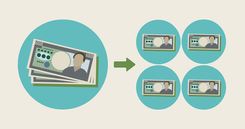It is important to understand the vital importance of cash savings in our lives. Saving is necessary to deal with financial problems that arise, such as a medical emergency or the unforeseen expense of a car repair. Saving also provides us with financial security, allowing us to live comfortably in the future.
Saving in cash also allows us to build a financial cushion for ourselves and our families. This means having some money in reserve for times of hardship, giving us the ability to deal with unexpected situations. Saving cash can also help us achieve our financial goals, whether it's achieving financial independence or a dream trip.
Advantages of saving cash
Saving cash is a fundamental tool for those who want to achieve their financial goals and have a good financial situation. This creates a number of advantages, such as the ability to prepare for any unforeseen events, pay taxes on time, and accumulate funds for education, retirement, or even to purchase durable goods.
The biggest advantage of saving cash is that it allows the individual to control his or her spending and get into the habit of saving. By accumulating cash, the individual is also building an emergency fund that will help deal with any unexpected situation. This avoids the need to take out loans or borrow to cover unexpected expenses.
Saving cash reduces financial stress by allowing the individual to obtain better interest rates when applying for bank loans. In addition, saving cash allows the individual to meet financial obligations such as paying taxes smoothly. Finally, saving cash also allows the individual to enjoy more of the present without worrying about his or her financial future.
Ways to save
Saving cash is one of the most popular ways to save. With cash savings, individuals can control their spending, set realistic financial goals and achieve them. Techniques such as tracking expenses, reducing unnecessary expenses and increasing income can be used to start saving.
Banks also offer different forms of savings. Time deposits offer a fixed interest rate and a small amount of funds can be withdrawn before the contract matures. Certificates of deposit (CDs) also provide a fixed rate of interest, but the amounts are subject to limitations and the funds must be held until the maturity of the contract.
Mutual funds are another popular way to save. They allow for investment diversification with the objective of earning higher returns than traditional banks. Individuals investing in mutual funds should familiarize themselves with the risks before investing.
Why Saving is Key to Financial Success
Saving is a key component to financial success. It is the foundation for financial growth, as it allows an individual to build wealth. Savings can also help individuals prepare for unforeseen events, as well as serve as emergency funds that allow them to deal with difficult situations.
Saving also provides individuals with peace of mind and financial security. When there are sufficient reserve funds, individuals have the freedom to make financial decisions, without the pressure and stress that come with a shortage of funds. Saving can help individuals achieve their financial goals, such as buying a home, financing a vehicle, or investing in a business.
In addition, saving is important for social security. When savings are accumulated over many years, they can provide protection in the event of illness or aging. This allows people to better prepare for the future without relying exclusively on social security. Therefore, it is clear that saving is key to establishing and maintaining financial stability.
Tips to improve your savings habits
It is important to save cash to achieve long-term financial goals. Here are some helpful tips to improve your savings habits: First, set a realistic budget for yourself. Think about how much money you are spending and how much you can save. Second, start saving a small amount each month. This amount can be as small as you want, but over time, it will add up. Finally, look for ways to reduce your spending so that more money is left over for savings.












